Dispose Large Amount of Dog Poop: Efficient Methods for a Clean Environment
Picture this: you have a spacious backyard, and a few lovable dogs who call it their playground. As much as you adore them, you can’t help but notice the mounting piles of poop they leave behind. Disposing of large amounts of dog waste seems like a smelly hassle, but don’t worry, we’ve got your back (and your nose) covered.
Managing significant amounts of dog waste is more than just an odorous problem; it’s also an environmental concern. When handled improperly, it can harm the soil, contaminate water sources, and lead to various health hazards.
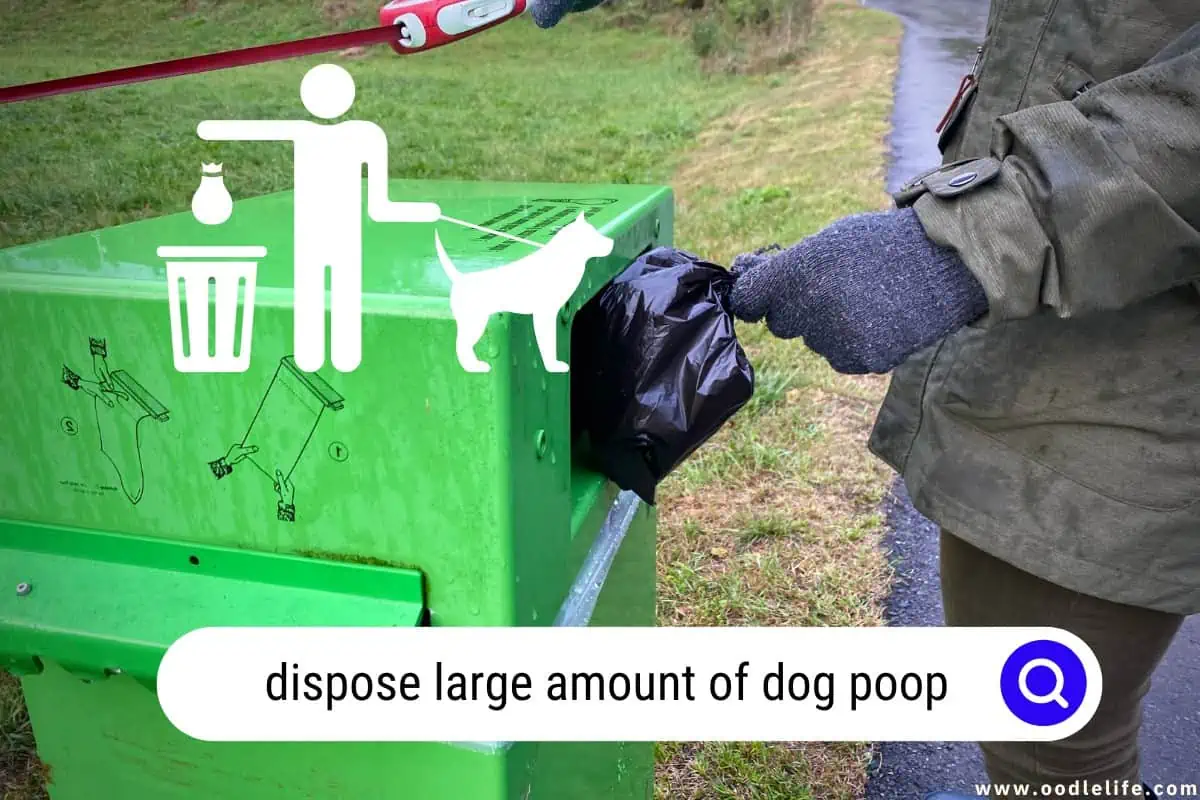
In the following paragraphs, we’ll offer some practical, eco-friendly solutions that will make the task of poop disposal more palatable and stress-free.
Understanding Dog Poop Issues
Dog poop is not just an annoying eyesore; it can also lead to serious environmental and health concerns. America’s 83 million pet dogs generate about 10.6 million tons of poop annually, which is equivalent to a line of tractor-trailers stretching from Seattle to Boston.
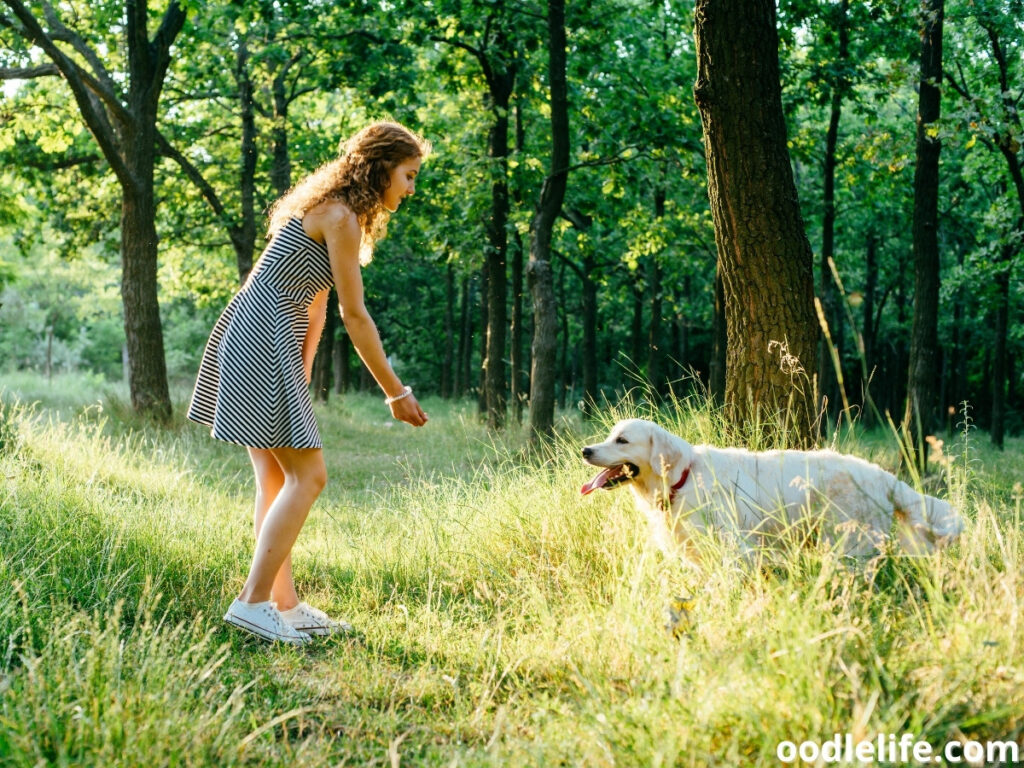
One of the biggest issues is that dog feces can transmit diseases and parasites, such as heartworms, whipworms, hookworms, roundworms, tapeworms, parvovirus, giardia, salmonella, and E. coli. This makes proper disposal crucial in maintaining a safe and clean environment for both humans and pets.
It’s essential to be aware of local regulations and guidelines when it comes to disposing of dog waste. Many communities have rules about scooping waste, using appropriate bags, and discarding waste in designated containers.
Finding efficient and environmentally friendly methods for disposing of large amounts of dog poop can be challenging. Some people create dog poop piles in remote locations, while others have designated poop pits or bag the waste for regular trash pickup. It’s important to assess the unique needs and constraints of the situation and find a suitable solution, keeping in mind that the ultimate goal is to prevent contamination and health risks.
Methods to Dispose Large Amount of Dog Poop
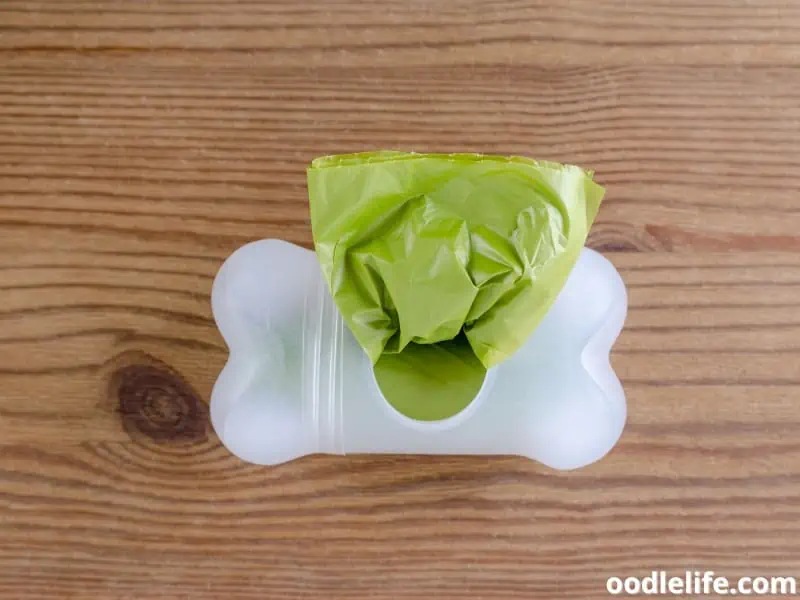
Composting
While composting dog poop might seem like an eco-friendly solution, it’s important to remember that pet waste contains pathogens. Attempting to compost it at home is not recommended, as achieving high enough temperatures to kill those pathogens is difficult. If you are considering composting, use a commercial composting site that accepts pet waste.
Burying
Burying dog poop is another option for large amounts of waste. This method keeps pet waste contaminants out of water sources and maintains cleanliness in parks and yards. Always dig a hole at least 12 inches deep and at least 200 feet away from any water sources to minimize the risk of contamination.
Flushing
The U.S. Environmental Protection Agency and the National Resources Defense Council both advocate for flushing dog poop down the toilet as a preferred disposal method. However, this should be done without using a bag, as the plastic can clog the plumbing system. Flushing only the waste is an efficient way to keep the environment clean and prevent water contamination.
Using Biodegradable Bags
Biodegradable bags can be a great alternative to single-use plastic bags for cleaning up pet waste. These bags will eventually break down in landfills, reducing the impact on the environment. Just remember to dispose of the bag and its contents properly in a designated waste bin.
Pet Waste Disposal Systems
For those with large amounts of dog waste, a pet waste disposal system, such as a doggy Dooley, can be an effective solution. These mini septic tank systems are installed in your yard and can handle the waste from multiple pets. Simply add waste terminator and water to the system according to the instructions, and let it decompose the waste.
Legal Considerations and Regulations
Disposing of dog poop involves not only environmental conscientiousness but also legal responsibilities. In the United States, many states impose fines on pet owners for not picking up and disposing of their dog’s waste properly. For example, a first-time offender could face a $100 fine while repeat offenders may see fines of up to $750.
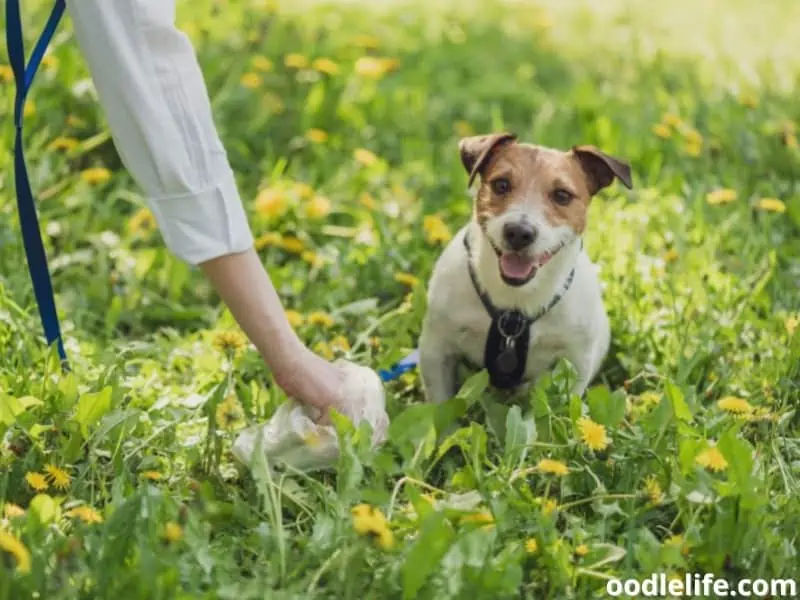
These laws are in place to prevent potential contamination of groundwater and reduce the risk of transmission of diseases. Since dog poop can contain harmful pathogens, proper disposal is crucial to maintaining public health and safety. Some municipalities may have their own specific rules and guidelines about container usage and methods of disposal.
In order to stay compliant with the law and protect public spaces, pet owners should be familiar with their local regulations on dog waste disposal. It’s always a good idea to carry poop bags or other appropriate tools when taking your dog for a walk, and make sure to place the dog waste in designated receptacles, or dispose of it properly back at home.
Environmental Impacts of Improper Dog Poop Disposal
When it comes to dog poop, neglecting proper disposal can lead to significant environmental consequences. For instance, the EPA estimates that waste from 100 dogs over two days could pollute a bay, closing watersheds within 20 miles.
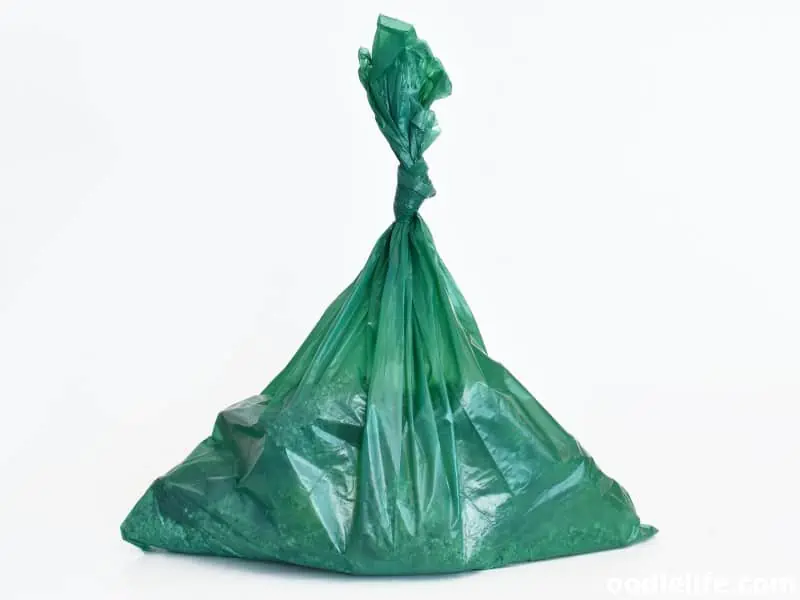
So, what’s the problem with letting Fido’s business linger? The issue lies in the bacteria and parasites. Harmful bacteria like E. coli, salmonella, and Giardia thrive in dog feces, which, when washed into waterways, can contaminate the water supply and harm aquatic life.
Furthermore, these bacteria have an appetite for oxygen, causing an underwater feast that deprives native aquatic life of this vital element. Algae blooms benefit from this situation, blocking sunlight and suffocating fish in the process. Talk about a poop party gone wrong!
When addressing dog waste, it’s essential to consider the following eco-friendly disposal methods:
- Flush it: The EPA and the National Resources Defense Council consider flushing dog poop (without a bag) as one of the best disposal methods.
- Biodegradable bags: Use these bags to collect and dispose of pet waste, reducing the environmental impact of plastic bags.
- Proper composting: While composting dog poop isn’t advisable for gardens, there are designated pet waste compost systems available.
Remember, taking care of your pup’s poop isn’t just a courtesy to your neighbors; it’s an essential step in protecting our environment. So, grab those bags and scoop responsibly for a happier, healthier planet.
Frequently Asked Questions
Q: Is it okay to just leave dog poop on the ground?
A: No, it’s important to pick up and dispose of dog poop properly, as it can contaminate soil or water sources and spread diseases.
Q: Can dog poop be composted?
A: Yes, it is possible to compost dog waste, but it requires proper methods such as using a closed container and maintaining the right balance of nitrogen-rich and dry materials.
Q: What is the best way to dispose of dog poop?
A: The simplest method is to collect the waste using a bag and throw it away in the trash. This helps protect the environment and prevent contamination.
Q: Can I flush dog poop down the toilet?
A: Flushing dog poop is an option, but make sure it does not contain any non-flushable materials and check with your local water treatment facility for guidelines.
Q: How much waste do dogs generate collectively?
A: According to Doody Calls, 78.2 million dogs in the United States generate approximately 10 million tons of waste annually. That’s enough to fill 268,000 tractor trailers!
Remember, it’s essential to properly manage and dispose of dog poop to keep our environment and communities clean and healthy. Plus, nobody likes stepping in an unexpected “surprise” on a nice walk!
Conclusion
In the end, managing large amounts of dog poop is a responsibility every pet owner must face. Remember, tossing it in the trash is a simple and effective method, but exploring alternatives like biogas production and commercial composting can add extra eco-friendliness to your disposal routine.
As we’ve seen, improperly disposed dog waste can lead to health risks and environmental issues, so it’s essential to be mindful in addressing this earthy challenge. So, the next time you’re scooping up that aromatic load, think about how you’re contributing not just to the cleanliness of your surroundings, but also to the wellbeing of our planet.
Remember: a clean yard is a happy yard, and a happy yard makes for happy humans and canines alike.